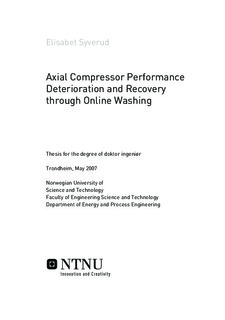| dc.contributor.author | Syverud, Elisabet | nb_NO |
| dc.date.accessioned | 2014-12-19T11:43:41Z | |
| dc.date.available | 2014-12-19T11:43:41Z | |
| dc.date.created | 2008-04-09 | nb_NO |
| dc.date.issued | 2007 | nb_NO |
| dc.identifier | 124021 | nb_NO |
| dc.identifier.isbn | 978-82-471-1884-9 | nb_NO |
| dc.identifier.uri | http://hdl.handle.net/11250/233363 | |
| dc.description.abstract | Gas turbine performance deterioration can negatively affect overall production capacity of power plants and cause major economic losses. Gas turbines deteriorate from fouling in the compressor section, and online washing is often applied to recover their performance. The success of online washing depends on site-specific issues, and current systems are inconsistent in use and their effectiveness is difficult to test. The objective of this work is to determine the fundamental mechanisms of axial compressor performance deterioration and recovery through online washing.
Empirical data from online washing of RB211-24G at an offshore site were analyzed in the initial phase of research. Empirical data from accelerated salt deterioration and online water washing of a GE J85-13 jet engine were unique to this project. First overall compressor deterioration and single stage performance deterioration were measured using inter-stage gas path instrumentation. Secondly, salt deposits were analyzed to characterize the stage surface roughness and fouling distribution. Finally, recovery through online washing was evaluated. Quasi-one-dimensional models were developed for the GE J85-13 to aid in the test data analysis and to verify the applicability of deterioration loss models to fouled compressors.
The study shows that detection of compressor deterioration can be hampered by nonlinear sensitivities to fouling. Engine control modes must be accounted for to avoid misreading the deterioration rate and production capacity. Flow rate was found as the most sensitive deterioration parameter in the GE J85-13. Fouling affected all parts of the stage characteristics reducing flow, pressure and head. The models successfully reflected the deterioration mechanisms although the effects of deterioration were under-predicted. This study shows the importance of applying Reynolds corrections to deteriorated compressors.
Online washing efficiency is predominantly affected by the water flow rate. Small droplets and low flow rates increase the fouling in the aft stages, and increased injection time cannot compensate for low flow rates. For effective water washing of the entire compressor section the recommended water-to-air ratio is between 0.8 to 2%.
The major contributions of this work are presented in four papers contained in the Appendices. | nb_NO |
| dc.language | eng | nb_NO |
| dc.publisher | Fakultet for ingeniørvitenskap og teknologi | nb_NO |
| dc.relation.ispartofseries | Doktoravhandlinger ved NTNU, 1503-8181; 2007:85 | nb_NO |
| dc.relation.haspart | Syverud, Elisabet; Bakken, Lars E; Langnes, Kyrre; Bjørnås, Frode. Gas Turbine Operation Offshore: On-Line Compressor Wash at Peak Load. Proc. ASME Turbo Expo: Power for Land, Sea, and Air: 2003-GT-30871, 2003. | nb_NO |
| dc.relation.haspart | Syverud, Elisabet; Brekke, Olaf; Bakken, Lars E. Axial Compressor Deterioration Caused by Saltwater Ingestion. Journal of Turbomachinery. 129(1): 119-126, 2007. | nb_NO |
| dc.relation.haspart | Syverud, Elisabet; Bakken, Lars E. Online Water Wash Test of GE J85-13. Journal of Turbomachinery. 129(1): 136-142, 2007. | nb_NO |
| dc.relation.haspart | Syverud, Elisabet; Bakken, Lars E. The Impact of Surface Roughness on Axial Compressor Performance Deterioration. Proc. GT2006 ASME Turbo Expo: GT2006-90004, 2006. | nb_NO |
| dc.title | Axial Compressor Performance Deterioration and Recovery through Online Washing | nb_NO |
| dc.type | Doctoral thesis | nb_NO |
| dc.contributor.department | Norges teknisk-naturvitenskapelige universitet, Fakultet for ingeniørvitenskap og teknologi, Institutt for energi- og prosessteknikk | nb_NO |
| dc.description.degree | dr.ing. | nb_NO |
| dc.description.degree | dr.ing. | en_GB |
